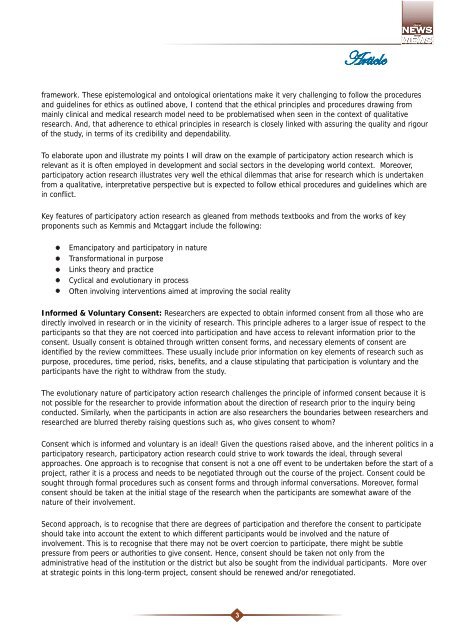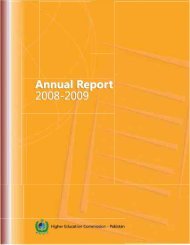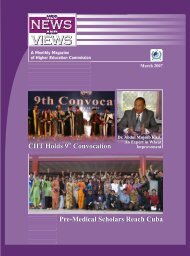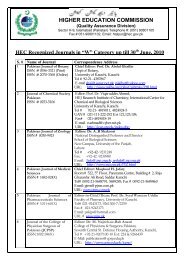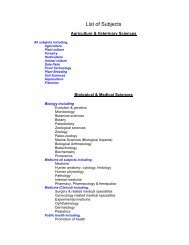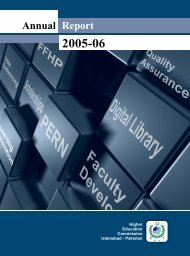Ethics Dilemmas in Qualitative Research - Higher Education ...
Ethics Dilemmas in Qualitative Research - Higher Education ...
Ethics Dilemmas in Qualitative Research - Higher Education ...
Create successful ePaper yourself
Turn your PDF publications into a flip-book with our unique Google optimized e-Paper software.
framework. These epistemological and ontological orientations make it very challeng<strong>in</strong>g to follow the procedures<br />
and guidel<strong>in</strong>es for ethics as outl<strong>in</strong>ed above, I contend that the ethical pr<strong>in</strong>ciples and procedures draw<strong>in</strong>g from<br />
ma<strong>in</strong>ly cl<strong>in</strong>ical and medical research model need to be problematised when seen <strong>in</strong> the context of qualitative<br />
research. And, that adherence to ethical pr<strong>in</strong>ciples <strong>in</strong> research is closely l<strong>in</strong>ked with assur<strong>in</strong>g the quality and rigour<br />
of the study, <strong>in</strong> terms of its credibility and dependability.<br />
To elaborate upon and illustrate my po<strong>in</strong>ts I will draw on the example of participatory action research which is<br />
relevant as it is often employed <strong>in</strong> development and social sectors <strong>in</strong> the develop<strong>in</strong>g world context. Moreover,<br />
participatory action research illustrates very well the ethical dilemmas that arise for research which is undertaken<br />
from a qualitative, <strong>in</strong>terpretative perspective but is expected to follow ethical procedures and guidel<strong>in</strong>es which are<br />
<strong>in</strong> conflict.<br />
Key features of participatory action research as gleaned from methods textbooks and from the works of key<br />
proponents such as Kemmis and Mctaggart <strong>in</strong>clude the follow<strong>in</strong>g:<br />
Emancipatory and participatory <strong>in</strong> nature<br />
Transformational <strong>in</strong> purpose<br />
L<strong>in</strong>ks theory and practice<br />
Cyclical and evolutionary <strong>in</strong> process<br />
Often <strong>in</strong>volv<strong>in</strong>g <strong>in</strong>terventions aimed at improv<strong>in</strong>g the social reality<br />
Informed & Voluntary Consent: <strong>Research</strong>ers are expected to obta<strong>in</strong> <strong>in</strong>formed consent from all those who are<br />
directly <strong>in</strong>volved <strong>in</strong> research or <strong>in</strong> the vic<strong>in</strong>ity of research. This pr<strong>in</strong>ciple adheres to a larger issue of respect to the<br />
participants so that they are not coerced <strong>in</strong>to participation and have access to relevant <strong>in</strong>formation prior to the<br />
consent. Usually consent is obta<strong>in</strong>ed through written consent forms, and necessary elements of consent are<br />
identified by the review committees. These usually <strong>in</strong>clude prior <strong>in</strong>formation on key elements of research such as<br />
purpose, procedures, time period, risks, benefits, and a clause stipulat<strong>in</strong>g that participation is voluntary and the<br />
participants have the right to withdraw from the study.<br />
The evolutionary nature of participatory action research challenges the pr<strong>in</strong>ciple of <strong>in</strong>formed consent because it is<br />
not possible for the researcher to provide <strong>in</strong>formation about the direction of research prior to the <strong>in</strong>quiry be<strong>in</strong>g<br />
conducted. Similarly, when the participants <strong>in</strong> action are also researchers the boundaries between researchers and<br />
researched are blurred thereby rais<strong>in</strong>g questions such as, who gives consent to whom?<br />
Consent which is <strong>in</strong>formed and voluntary is an ideal! Given the questions raised above, and the <strong>in</strong>herent politics <strong>in</strong> a<br />
participatory research, participatory action research could strive to work towards the ideal, through several<br />
approaches. One approach is to recognise that consent is not a one off event to be undertaken before the start of a<br />
project, rather it is a process and needs to be negotiated through out the course of the project. Consent could be<br />
sought through formal procedures such as consent forms and through <strong>in</strong>formal conversations. Moreover, formal<br />
consent should be taken at the <strong>in</strong>itial stage of the research when the participants are somewhat aware of the<br />
nature of their <strong>in</strong>volvement.<br />
Second approach, is to recognise that there are degrees of participation and therefore the consent to participate<br />
should take <strong>in</strong>to account the extent to which different participants would be <strong>in</strong>volved and the nature of<br />
<strong>in</strong>volvement. This is to recognise that there may not be overt coercion to participate, there might be subtle<br />
pressure from peers or authorities to give consent. Hence, consent should be taken not only from the<br />
adm<strong>in</strong>istrative head of the <strong>in</strong>stitution or the district but also be sought from the <strong>in</strong>dividual participants. More over<br />
at strategic po<strong>in</strong>ts <strong>in</strong> this long-term project, consent should be renewed and/or renegotiated.<br />
3


